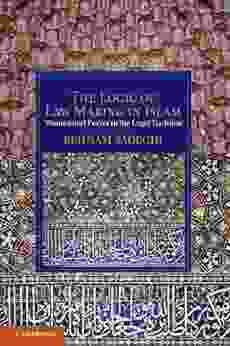Women and Prayer in the Legal Tradition: A Journey through Islamic Jurisprudence

Prayer is a fundamental pillar of Islam, and its importance is emphasized throughout the Quran and the Sunnah of the Prophet Muhammad (SAW). For centuries, Islamic scholars have engaged in rigorous debates and discussions regarding the proper way to perform prayer, including the specific requirements and regulations for women. This article delves into the rich legal tradition of Islam, exploring the diverse perspectives of prominent scholars on women and prayer.
4 out of 5
| Language | : | English |
| File size | : | 3451 KB |
| Text-to-Speech | : | Enabled |
| Screen Reader | : | Supported |
| Enhanced typesetting | : | Enabled |
| Print length | : | 242 pages |

Women praying in a mosque
Historical Context
In the early days of Islam, women were actively involved in religious practices, including prayer. They could pray in mosques alongside men, and there were no restrictions on their participation in communal prayers. However, as the Islamic empire expanded and various cultural influences were incorporated, certain practices and interpretations emerged that limited women's roles in religious spaces.
Legal Perspectives
Over the centuries, different schools of Islamic jurisprudence have developed their own interpretations and rulings regarding women and prayer. These perspectives vary in terms of their strictness and permissiveness, and they reflect the specific cultural and historical contexts in which they were formulated.
- Hanafi School: The Hanafi school, prevalent in Central Asia and South Asia, allows women to pray in mosques but requires them to pray in a separate section or behind men. They also permit women to lead prayers for other women if there are no male imams present.
- Maliki School: The Maliki school, followed in North Africa and West Africa, generally prohibits women from praying in mosques. However, they may pray in their homes or private spaces.
- Shafi'i School: The Shafi'i school, widespread in Southeast Asia and parts of East Africa, also discourages women from praying in mosques but allows them to do so under certain conditions, such as if there is no other suitable place available.
- Hanbali School: The Hanbali school, predominant in Saudi Arabia and some Gulf countries, strictly prohibits women from praying in mosques. They argue that prayer should be performed in the home, where women can maintain their privacy and modesty.
Contemporary Debates
In recent decades, there has been a renewed interest in the role of women in Islam and a growing movement to promote gender equality within Muslim communities. This has led to debates and discussions among scholars and activists regarding the interpretation of Islamic texts and the need to revisit traditional practices.
Many contemporary scholars argue that the restrictions imposed on women's prayer are not based on divine injunctions but rather on cultural norms and patriarchal interpretations. They emphasize the importance of allowing women to participate fully in all aspects of religious life, including prayer.

Women leading a prayer congregation
The legal tradition of Islam regarding women and prayer is a complex and multifaceted subject that has evolved over centuries. Different schools of jurisprudence have offered varying perspectives on the permissibility and conditions of women's prayer, reflecting the influence of cultural and historical contexts. In contemporary times, there is a growing movement to challenge traditional practices and promote gender equality within Muslim communities, leading to ongoing debates about the interpretation of Islamic texts and the role of women in religious life.
Additional Resources
For those interested in further exploring this topic, here are some recommended resources:
- Women and Prayer in the Legal Tradition: A Journey through Islamic Jurisprudence by Amy Singer
- Gender and Islamic Law: Theory and Practice by Ziba Mir-Hosseini
- Women in the Quran: An Interpretation by Amina Wadud
- The Oxford Handbook of Gender and Islam edited by Leslie Peirce and Asma Afsaruddin
4 out of 5
| Language | : | English |
| File size | : | 3451 KB |
| Text-to-Speech | : | Enabled |
| Screen Reader | : | Supported |
| Enhanced typesetting | : | Enabled |
| Print length | : | 242 pages |
Do you want to contribute by writing guest posts on this blog?
Please contact us and send us a resume of previous articles that you have written.
 Book
Book Novel
Novel Page
Page Chapter
Chapter Text
Text Story
Story Genre
Genre Reader
Reader Library
Library Paperback
Paperback E-book
E-book Magazine
Magazine Newspaper
Newspaper Paragraph
Paragraph Sentence
Sentence Bookmark
Bookmark Shelf
Shelf Glossary
Glossary Bibliography
Bibliography Foreword
Foreword Preface
Preface Synopsis
Synopsis Annotation
Annotation Footnote
Footnote Manuscript
Manuscript Scroll
Scroll Codex
Codex Tome
Tome Bestseller
Bestseller Classics
Classics Library card
Library card Narrative
Narrative Biography
Biography Autobiography
Autobiography Memoir
Memoir Reference
Reference Encyclopedia
Encyclopedia Rose Lamatt
Rose Lamatt Bonnie J Addario
Bonnie J Addario Tom Fisher
Tom Fisher Berty Ashley
Berty Ashley Frank R Noyes
Frank R Noyes Ben Ong
Ben Ong Pamela Traynor
Pamela Traynor Dr Gertrise Thomas
Dr Gertrise Thomas Bai Tian
Bai Tian Barry Reisberg
Barry Reisberg Ronald Rex
Ronald Rex Merle Miller
Merle Miller Richard Jacobs
Richard Jacobs Simon Taylor
Simon Taylor Isabelle Biron
Isabelle Biron Basil Gold
Basil Gold Michael Winerip
Michael Winerip Barry Long
Barry Long Axel Von Kalben
Axel Von Kalben Barbara Tedlock
Barbara Tedlock
Light bulbAdvertise smarter! Our strategic ad space ensures maximum exposure. Reserve your spot today!
 George OrwellFollow ·16.3k
George OrwellFollow ·16.3k Isaac MitchellFollow ·6.7k
Isaac MitchellFollow ·6.7k Sidney CoxFollow ·11.6k
Sidney CoxFollow ·11.6k Brennan BlairFollow ·12.2k
Brennan BlairFollow ·12.2k Andrew BellFollow ·17.4k
Andrew BellFollow ·17.4k Natsume SōsekiFollow ·13.8k
Natsume SōsekiFollow ·13.8k Cole PowellFollow ·16.8k
Cole PowellFollow ·16.8k Jim CoxFollow ·8.8k
Jim CoxFollow ·8.8k

 Corey Hayes
Corey HayesEasy Delicious Recipes To Heal The Immune System And...
: The Cornerstone...

 Cody Russell
Cody RussellMastering Medical Terminology: A Comprehensive Guide for...
Navigating the...

 Ibrahim Blair
Ibrahim BlairBeat Cancer Symptoms: Your Essential Guide to Symptom...
Are you struggling with the debilitating...

 Finn Cox
Finn CoxHow to Be the Best at Work and Still Have Time to Play:...
Are you tired...
4 out of 5
| Language | : | English |
| File size | : | 3451 KB |
| Text-to-Speech | : | Enabled |
| Screen Reader | : | Supported |
| Enhanced typesetting | : | Enabled |
| Print length | : | 242 pages |
















